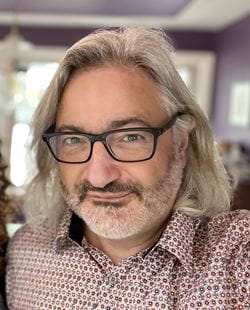
What makes poetry so powerful?
 by Jon Kuiperij – Mar 19, 2021
by Jon Kuiperij – Mar 19, 2021 
In Take 5, Sheridan's thought leaders share their expert insight on a timely and topical issue. Learn from some of our innovative leaders and change agents as they reflect on questions that are top-of-mind for the Sheridan community.
 In 1999, the United Nations Educational, Scientific and Cultural Organization (UNESCO) proclaimed March 21 as World Poetry Day in order to celebrate one of humanity’s most treasured forms of cultural and linguistic expression and identity. In this installment of Take 5, Gary Barwin, an award-winning poet, composer and multi-disciplinary artist who is currently the Writer-in-Residence in Sheridan’s Honours Bachelor of Creative Writing & Publishing degree program, discusses the power of poetry, its role in society and more.
In 1999, the United Nations Educational, Scientific and Cultural Organization (UNESCO) proclaimed March 21 as World Poetry Day in order to celebrate one of humanity’s most treasured forms of cultural and linguistic expression and identity. In this installment of Take 5, Gary Barwin, an award-winning poet, composer and multi-disciplinary artist who is currently the Writer-in-Residence in Sheridan’s Honours Bachelor of Creative Writing & Publishing degree program, discusses the power of poetry, its role in society and more.
1. Amanda Gorman’s reading of her poem ‘The Hill We Climb’ is widely considered one of the most memorable moments of U.S. President Joe Biden’s recent inauguration ceremony and prompted tremendous response and engagement. What is poetry’s place in literature as a genre that can connect with people in ways that other genres might not?
One thing that poetry does, which we saw in that Amanda Gorman reading, is to use language in a specialized and stylized way that resonates powerfully. It’s not primarily about the story. The moment of discovery is as the words are happening. Poetry happens right in front of you, like a magic trick or crying or a joke. Another important function of poetry is how it makes you think about and discover what is possible to say and how it’s possible to say it. And perhaps why you have chosen to say this thing and not some other thing. You see the act of thinking or speaking or communicating in action, and there’s something special about that. You don’t remember the whole meal; you remember the moments of taste and texture. Even the sound of poetry and the way it’s said can be powerful in itself, let alone the actual content, which I think is different from novels or journalism. It’s like hearing an immensely powerful song where you don’t know what the words are. The words are important, but some of the meaning and the effect is the sound and the rhythm and the music of it all.
2. Speaking of Amanda Gorman, a prominent publisher has had difficulty finding someone to translate her poem into the Spanish language of Catalan, including backlash from critics questioning why a White writer had been chosen to translate a Black writer’s work. Are poetry and literature changing in response to the Black Lives Matter movement and other efforts to increase equity, diversity and inclusion in the world?
I think changes go back longer than that, but there’s been an increasing awareness that there have always been diverse voices writing in poetry that have been left out of the mainstream and people are rediscovering those. There’s always more work to be done. I think poetry is up for it. Poetry is great at asking questions, at destabilizing and making us look things in a different way, incorporating a diversity of voices of ways of thinking. That’s what poetry is for. So it’s a very powerful medium for diverse voices to speak and for other people to then listen to those voices. At the same time, there’s a construction in poetry of who is saying it and why are they saying it and what is the occasion that it’s being spoken or written for, so poets and the poetry world are particularly sensitive to that. In the situation of translating Amanda Gorman’s poem, there’s an awareness of who is saying those words and who it makes sense to have translate those words, because poetry is so connected to the constructed identity of the person who is speaking.
3. What roles and responsibilities do poets have in documenting history and reflecting contemporary society?
There is poetry that just makes you feel warm and fuzzy, like a rom-com that is designed to give you a pleasant experience. That function exists in many types of art experience. But there’s also other experiences to be had. Some poetry has an important role to play in making us reflect on how we think about things, how we feel about things and what our place is in the world. It also has an important role to bring that kind of inquiry into both the present and the past. Journalists report what happened, but poetry can really give voice to the present moment and sensibility and help us unpack our assumptions and experiences. That doesn’t mean there’s a particular way we should do poetry. One of the things poetry can do is to talk about how language is used, and we need to be on guard—never more than now perhaps— to how language is used by media and politicians and through perceived notions of things. We’re surrounded by language and it’s really important to take it apart, understand what it’s doing and how it’s structuring our reality.
4. You’re a multi-talented artist who is known for mentoring and collaborating with other artists across many genres and fields. Is that type of multi-disciplinary approach necessary to flourish in today’s age of writing and publishing?
I don’t think it’s necessary to be successful, but we are increasingly in a multimedia world and things are mediated by social media, by computers, by the Internet, by all those possibilities that are right there at our desks. We don’t just have notepads anymore. The page is not just a page anymore, it’s this whole multimedia network that we are in all day. You can make sound, music or video on your phone. It’s not only an opportunity, it also feels to me like an important part of entering into conversation that’s already happening.
5. It’s no secret that we’re living in an increasingly paperless world that generally favours digitized media over traditional print. What do you see as the future for writing and publishing?
I think there’s two sides to this. One is the vastly expanded range of publishing opportunities, all of the media and Internet and digital and multimedia possibilities. We’re surrounded by made content all the time, so writing and publishing is part of that in its own particular way. At the same time, there’s also a return to interest in what we’re missing from that, which is the handmade, the local, the small, the tactile. For example, indie bookstores are having a resurgence because people want that one-on-one experience of person and place, rather than ordering from an abstraction online. When we lose something important like some part of print media, there’s no question that we are lesser for it. The question then is what are we able to do to replace it or morph it into something different so we can still maintain those values that are really important. The more that things become corporate and these vast corporate forces determine things, we as writers need to find a place to be able to speak authentically and speak truth to power. A book is still an outstanding human invention. It’s such a profoundly remarkable piece of technology when you consider what it’s capable of doing. We don’t need to get the weather from our local newspaper anymore because our phones are quicker and more efficient, but there are other things we can only get from our local newspaper or a book. We just need to understand print and digital can do different things, and then explore what that might mean.
Multi-talented artist Gary Barwin is this year’s Writer-in-Residence in Sheridan’s Honours Bachelor of Creative Writing & Publishing degree program. An author of more than 25 books of fiction and poetry, Gary holds a PhD in music composition and remains a prolific mentor to and collaborator with artists in a multitude of genres and fields. His best-selling novel Yiddish for Pirates won the Stephen Leacock Medal for Humour and the Canadian Jewish Literary Award, and was shortlisted for both the Giller and Governor General’s Awards in 2016. His newest novel Nothing the Same, Everything Haunted: The Ballad of Motl the Cowboy has just been released.
Interested in connecting with Gary Barwin or another Sheridan expert? Please email communications@sheridancollege.ca.
The interview has been edited for length and clarity.
Media Contact
For media inquiries, contact Sheridan’s Communications and Public Relations team.





